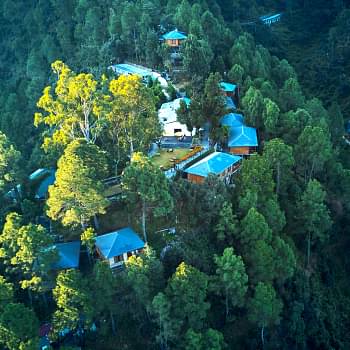July 06, 2023
Everything You Need to Know About World Nature Conservation Day
CM Content Team


View all
140+
Resorts
July 06, 2023
CM Content Team
Nature Conservation Day is an annual observance dedicated to raising awareness about the importance of protecting and conserving nature. Celebrated on July 28 every year around the world, this day serves as a reminder of the critical role that ecosystems and biodiversity play in sustaining life on Earth.
The day aims to promote sustainable practices, and the preservation of natural resources. World Nature Conservation Day encourages individuals, organizations, and communities to take action, whether through conservation initiatives, reforestation efforts, wildlife protection, or advocating for sustainable policies. It serves as a platform to educate, inspire, and mobilize people to make a positive impact on the environment and ensure a more sustainable future for generations to come.
In 1997, the International Union for Conservation of Nature (IUCN) declared July 28th as World Nature Conservation Day. The purpose was to emphasize the significance of nature conservation and sustainable practices for the well-being of the planet.
Since then, World Conservation Day has gained momentum worldwide, with organizations, governments, and individuals organizing events, campaigns, and initiatives to promote conservation efforts. It serves as a reminder that everyone has a role to play in preserving the Earth's biodiversity, combating climate change, and ensuring a sustainable future for all species.
Also Read: World Environment Day – Eco Friendly Products You Can Buy to Ensure Environmental Sustainability
This day holds immense importance in raising awareness and promoting actions to address the environmental challenges faced by our planet. Here are some key reasons why this day is significant:

International Nature Conservation Day highlights the importance of conserving biodiversity, including the protection of endangered species and the preservation of ecosystems. It reminds us of the interconnectedness of all life forms and the need to maintain a delicate balance in nature.

The day serves as an opportunity to educate people about environmental issues, sustainable practices, and the impact of human activities on the planet. It promotes environmental literacy and empowers individuals to make informed choices in their daily lives.

World nature conservation plays a crucial role in mitigating climate change. Forest preservation, reforestation efforts, and the protection of natural carbon sinks contribute to reducing greenhouse gas emissions and maintaining ecological equilibrium.

By highlighting the importance of nature conservation, this day ensures that future generations inherit a healthy and vibrant planet. It instils a sense of responsibility and environmental consciousness in younger generations, empowering them to become advocates for sustainable practices.

World Nature Conservation Day emphasizes the importance of integrating conservation efforts into sustainable development practices. It encourages the adoption of eco-friendly approaches in industries, agriculture, and infrastructure development to ensure a harmonious coexistence between human activities and the environment.
Also Read: Steps We Can Take to Ensure Animal Safety and Conservation
Conserving nature is a collective responsibility that requires individual actions. Here are some practical steps you can take to contribute to nature conservation:
Also Read: Sustainable Gastronomy Day: Club Mahindra’s Food Sustainability Initiatives & Innovations
As India’s leading hospitality and vacation company, we have implemented numerous measures to preserve nature. We have incorporated various sustainable practices into its daily operations across multiple Club Mahindra resorts, focusing on optimizing water usage and efficient waste management. Some of our most prominent initiatives for nature conservation are:
In conclusion, the harmonious coexistence of nature conservation and tourism is of utmost importance in our quest for sustainable travel. By making conscious decisions as travellers, we can play a significant role in preserving the natural beauty and resources of our planet. Let us embark on our journeys with a deep sense of responsibility, knowing that our collective efforts can make a positive impact on the world we explore, ensuring that future generations can also enjoy the wonders of nature.
Mahindra Holidays & Resorts India Ltd. (MHRIL), a part of Leisure and Hospitality sector of the Mahindra Group, offers quality family holidays primarily through vacation ownership memberships and brings to the industry values such as reliability, trust and customer satisfaction. Started in 1996, the company's flagship brand ‘Club Mahindra’, today has over 300,000 members , who can holiday at 140+ resorts in India and abroad.
We use cookies to personalise content and to provide you with an improved user experience.By Continuing to browse this site you consent to the use of cookies.Please visit our cookie policy for further details.

Welcome to ClubMahindra.com In order to provide a personalised experience for you, we use cookies to enable some website functionality. Cookies help us see which articles most interest you; allow you to easily share articles on social media channels; permit us to deliver content personalised to your interests and locations; along with many other site benefits. For more information, please review our Cookie Policy
When you visit any website, it may store or retrieve information on your browser, mostly in the form of cookies. This information might be about you, your preferences or your device and is mostly used to make the site work as you expect it to. The information does not usually directly identify you, but it can give you a more personalized web experience. Because we respect your right to privacy, you can choose not to allow some types of cookies. Click on the different category headings to find out more and change our default settings. However, blocking some types of cookies may impact your experience of the site and the services we are able to offer.
Because we respect your right to privacy, you can choose not to allow some types of cookies and you have the right to withdraw your consent by send a mail to email id [email protected]
These cookies are essential in order to enable you to move around the site and use its features, such as accessing secure areas of the site. Without these cookies, services you have asked for cannot be provided.
These cookies allow us to employ data analytics so we can measure and improve the performance of our site and provide more relevant content to you. These cookies don't collect information that identifies a visitor down to an individual level that is available to us. These cookies are not passing personally identifiable information to any external third party other than in limited cases when we engage a service provider to act on our behalf but who is then unable to use the data for their own purposes.
Performance cookies are generally third-party cookies from vendors we work with or who work on our behalf that collect information about your visit and use of the Club Mahindra website, for instance which pages you visit the most often, and if you get error messages from web pages. These cookies don't collect information that identifies a visitor. All information these cookies collect is anonymous and is only used to improve your overall experience on how the website works. Third party vendors may have access to this data and may use it to improve their overall services and offerings.
Functionality cookies allow a site to remember choices you make (such as your user name, language or the region you are in) and provide more enhanced, personal features. These cookies cannot track your browsing activity on other websites. They don't gather any information about you that could be used for advertising or remembering where you've been on the Internet outside our site.
Third-party advertising and social media cookies are used to (1) deliver advertisements more relevant to you and your interests; (2) limit the number of times you see an advertisement; (3) help measure the effectiveness of the advertising campaign; and (4) understand people's behaviour after they view an advertisement. They are usually placed on behalf of advertising networks with the site operator's permission. They remember that you have visited a site and quite often they will be linked to site functionality provided by the other organization. This may impact the content and messages you see on other websites you visit. If you do not allow these cookies you may not be able to use or see certain these sharing tools content on our website.